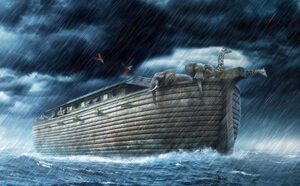
I feel like I’m at a loss! But how can I truly be defeated when no one has accused me or judged against me? In past years, I often said it wasn’t particularly important to write articles that pose questions and then answer them, as most of these writings tend to be intellectual curiosities, offering knowledge devoid of life application.
However, my dear brother or sister, though I seem to contradict myself by writing this article structured as a question and answer, my prayer is that this piece won’t just satisfy your curiosity about things you didn’t know, but that it will also inspire you to discover and live out God’s work in your life. Just as none of Samuel’s words fell to the ground unfulfilled (1 Samuel 3:19), I trust that every word of this article will deepen our knowledge of God as members of the Church and stir us to greater hope.
Depictions of Jesus in Visual Media
In various teaching aids (films), Jesus is often portrayed as a man with medium-length hair and a beard, a calm demeanor, and a robe reaching below His knees. The robe is sometimes open at the chest and tied with straps, with a belt at the waist. He’s often shown wearing sandals and carrying a leather satchel slung over His shoulder. In some depictions, He has a head covering similar to what we might call a “bandana” today. But who is this figure? He is Jesus, foretold in the Scriptures of the Old Testament and fulfilled in the New Testament as the Savior and King of all humanity. But why is He called a Nazarene if He was born in Bethlehem?
Born in Bethlehem
The prophet Micah prophesied that the Messiah would be born in Bethlehem: “But you, Bethlehem Ephrathah, though you are small among the clans of Judah, out of you will come for me one who will be ruler over Israel, whose origins are from of old, from ancient times.” (Micah 5:2)
Matthew confirmed this prophecy in his Gospel, explaining that Jesus’ birthplace fulfilled Micah’s words: “When he had called together all the chief priests and teachers of the law, he asked them where the Messiah was to be born. They replied, ‘In Bethlehem in Judea, for this is what the prophet has written: “But you, Bethlehem, in the land of Judah, are by no means least among the rulers of Judah; for out of you will come a ruler who will shepherd my people Israel.”’” (Matthew 2:4-6)
Prophets Foretold He Would Be Called a Nazarene
Though Jesus was born in Bethlehem, the Scriptures also foretold that He would be called a Nazarene:
“But when he heard that Archelaus was reigning in Judea in place of his father Herod, he was afraid to go there. Having been warned in a dream, he withdrew to the district of Galilee, and he went and lived in a town called Nazareth. So was fulfilled what was said through the prophets, that he would be called a Nazarene.” (Matthew 2:22-23)
Why, then, is Jesus called a Nazarene based on where He lived, rather than a Bethlehemite based on where He was born?
Joseph and Mary, Jesus’ earthly parents, lived in Nazareth in the region of Galilee before His birth (Luke 1:26-27). Naturally, Jesus should have been born in Nazareth, where His family resided. However, the prophet Micah had already foretold that the Messiah would be born in Bethlehem. To fulfill this prophecy, God orchestrated events, prompting Emperor Caesar Augustus to issue a decree requiring all citizens to return to their ancestral towns for a census. This decree brought Joseph and Mary to Bethlehem, where Jesus was born, perfectly fulfilling the prophecy (Luke 2:1-7).
After the census, Joseph and Mary returned to Nazareth (Matthew 2:22-23). Even after fleeing to Egypt to escape King Herod’s wrath, they eventually settled back in Nazareth, fulfilling yet another prophecy: “Out of Egypt I called my son.” (Matthew 2:15). Because Jesus grew up in Nazareth, He became known as a Nazarene.
Lessons and Reflections
The Integrity of Scripture
The fulfillment of these prophecies demonstrates the reliability of God’s word. Jesus’ birth in Bethlehem was orchestrated through a census decree, ensuring Micah’s prophecy was fulfilled. Similarly, His upbringing in Nazareth fulfilled the words of the prophets.
God’s Perfect Timing
Had Joseph and Mary remained in Egypt, the prophecy of Jesus being a Nazarene might not have come to pass. God’s providence ensured their return to Nazareth, emphasizing that His plans are precise and timely.
Trust in God’s Plan
You may find yourself in circumstances that seem at odds with God’s promises over your life. Yet, just as God used both ordinary events (the census) and extraordinary ones (angelic warnings) to fulfill His plans for Jesus, He can use any situation to bring His purposes to fruition in your life. Whether through smooth paths like the census journey or challenging ones like fleeing to Egypt, God’s plans for you remain for your good and His glory (Jeremiah 29:11).
Provision Amidst Trials
Despite fleeing to Egypt, Joseph and Mary were sustained by the gifts of the Magi—gold, frankincense, and myrrh (Matthew 2:11). These resources likely provided for their needs during exile. In the same way, God prepares provisions for His people even in the midst of challenges.
Live with Faith!
Be encouraged to trust in the divine plan of God, no matter your circumstances. Like Jesus’ journey from Bethlehem to Egypt to Nazareth, your path may include unexpected detours, but God’s purpose will always prevail. And just as He provided for Joseph, Mary, and Jesus, He will sustain and guide you through every step of your journey.
Maranatha!
The Lord Jesus is coming soon!



